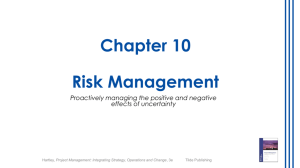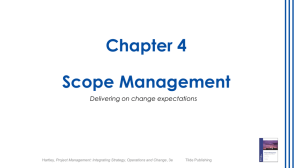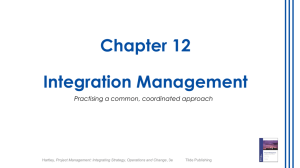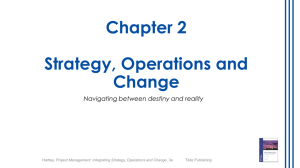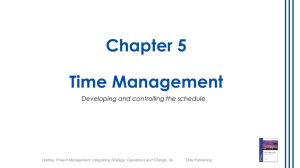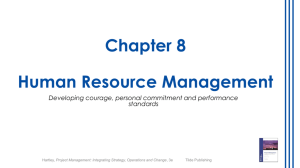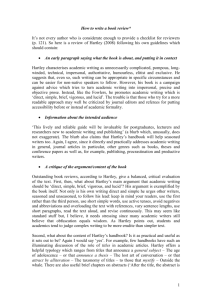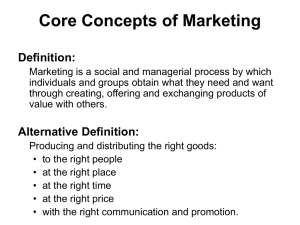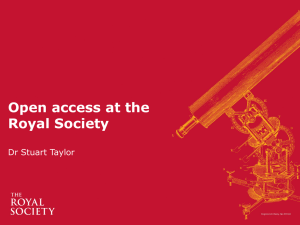Tb-Hartley-ProjectManagement3e-Ch6-PPTs
advertisement
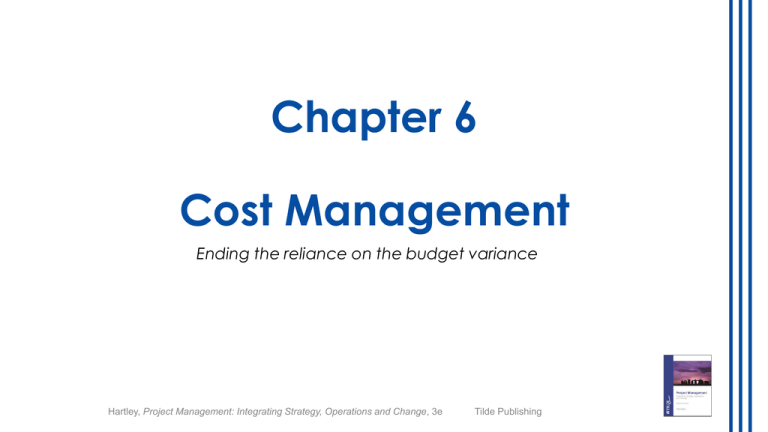
Chapter 6 Cost Management Ending the reliance on the budget variance Hartley, Project Management: Integrating Strategy, Operations and Change, 3e Tilde Publishing Chapter overview 1. 2. 3. 4. 5. Planning for cost management Estimating project costs Pulling the budget together Controlling project costs Crashing the schedule © 2014 Hartley, Project Management: Integrating Strategy, Operations and Change, 3e Tilde Publishing 2 Planning for cost management It is the planning process that establishes the policies, procedures and documentation for planning, managing, expending and controlling project costs, given different stakeholders contribute different amounts of funding measure costs differently report costs in different ways control costs at different times © 2014 Hartley, Project Management: Integrating Strategy, Operations and Change, 3e Tilde Publishing 3 Estimating project costs Pre-determined Expert judgement Analogous Group decision making Unit rates Published commercial data Parametric Vendor bid Reserve 3 point © 2014 Hartley, Project Management: Integrating Strategy, Operations and Change, 3e Tilde Publishing 4 Pulling the budget together Traditional Zero based Program Top down Bottom up © 2014 Hartley, Project Management: Integrating Strategy, Operations and Change, 3e Tilde Publishing 5 Controlling project costs Option 1 Traditional Budget o Budget – Actual = Variance o Reports a positive or negative value Option 2 Earned value analysis o Planned value, Earned value, Actual cost o Historical and predictive performance analysis © 2014 Hartley, Project Management: Integrating Strategy, Operations and Change, 3e Tilde Publishing 6 Crashing the schedule Cost Slope = Crash Cost – Normal Cost Normal Duration – Crash Duration © 2014 Hartley, Project Management: Integrating Strategy, Operations and Change, 3e Tilde Publishing 7 Review questions 1. How would a cost management plan address the challenges of managing project costs within the internal financial procedures and accounting codes of the organisation? 2. What are some of the challenges estimating project (resource) costs, and how can these be overcome? 3. What benefits do budgeting processes bring to projects, and what weaknesses to they possess? 4. What does traditional budgeting fail to report and control in project management? 5. How does earned value management provide for both schedule and cost performance reporting, analysis and forecasting? © 2014 Hartley, Project Management: Integrating Strategy, Operations and Change, 3e Tilde Publishing 8 Group learning activities Discuss why a cost management plan is needed in addition to existing organisational financial systems, processes and controls Review the estimating techniques and identify learner preference and rationale Flowchart the budget preparation and management activities Critique a budget report looking for how it addresses historical and forecast project performance Discuss where earned value management may not be applicable (and why) in some projects © 2014 Hartley, Project Management: Integrating Strategy, Operations and Change, 3e Tilde Publishing 9 Assessment options Create a cost management plan that will be effective in guiding and directing how project costs are dealt with throughout the project Develop a template for a non-traditional budget that captures more meaningful and relevant data Generate an earned value report (Excel or MS Project) on a current report and assess both past and future performance Short answer questions Multiple choice questions © 2014 Hartley, Project Management: Integrating Strategy, Operations and Change, 3e Tilde Publishing 10
